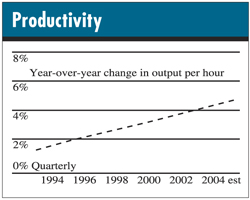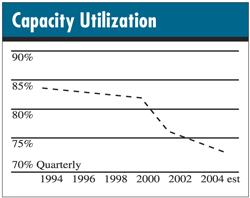Bon Voyage, U.S. Jobs
Eight million Americans are
currently out of work. For every new job opening today,
about three people will remain unemployed. By 2015, another
1.3 million U.S. jobs will be outsourced to countries such
as India, Russia, China and the Philippines. During the
last four years alone, unemployment increased by 33 percent.
The West Coast has been hit the hardest. Oregon’s
unemployment rate stands at 7.2 percent, Washington’s
at 6.8 percent and California’s at 6.4 percent. By
sectors, manufacturing has seen the biggest loss; 1.5 million
jobs disappeared during the past four years. Information
and technology jobs decreased by 181,500, most of them in
software and communications companies. Cutbacks in banking
and insurance resulted in 111,300 jobs lost in the financial
services sector.


|
Pink slips are killing employee morale. The U.S. Department
of Labor recorded 8,191 massive layoffs in 2003, which resulted
in nearly 1.7 million workers losing their jobs. This is
the highest number of people put out of work in one year
since the Department of Labor began collecting data. If
you consider that the average cost to replace an employee
is $65,000, this figure translates to $110.5 billion in
added costs to the U.S. economy.
“Fears about job security are understandably significant
when nearly 2 million of our workforce has been unemployed
for more than a year,” notes Federal Reserve Chairman
Alan Greenspan.
Is any part of the economy safe? The answer is yes. To
date, the health care industry hasn’t suffered from
massive layoffs, but how long will that last? Dubai, United
Arab Emirates, is building a state-of-the-art health care
city; it’s as good or better than any health care
service the U.S. can provide. In fact, Dubai has hired medical
talent from North America and Europe to define its design
and operating procedures. With U.S. health care costs increasing
so rapidly, soon it will cost less to fly to Dubai for major
surgery than to pay for comparable treatment in this country.
I already know of people who fly to India for major dental
work. Individuals from the Middle East, who now buy their
health care services from the United States and Europe,
will soon seek treatment in Dubai.
Yes, the United States is losing jobs, but so are many
other countries around the world. The 20 largest economies
lost 22 million manufacturing jobs between 1995 and 2002.
China had the biggest loss--50 million manufacturing jobs--during
the same seven-year period.
Quality professionals, with their focus on eliminating
waste, have contributed significantly to a steady increase
in productivity during the last 10 years. Unfortunately,
this hasn’t contributed to job security. Output per
hour has increased by 300 percent during this decade. But
instead of organizations putting this increased productivity
to work by making more products, in many cases equipment
was left idle and jobs were cut to the bone. Meanwhile,
capacity utilization dropped from 84 percent in 1994 to
75 percent in 2003--a plummet of nearly 11 percent. Is it
any wonder we have such a high unemployment rate?
The clothing industry is a good example of what’s
happening to U.S. industries today. In 1997, about 44 percent
of the clothes sold in the United States were made in this
country. Just six years later, only 25 percent of the clothes
were U.S. made. That’s a drop of 42 percent.
In the past, manufacturing accounted for 50 percent of
our jobs. Now that figure is down to 14 percent. During
the 19th century, agriculture accounted for 50 percent of
our jobs. Now it’s down to 2.5 percent, even though
we’re producing more food than ever before.
As quality professionals, we must focus on helping our
organizations develop new markets and grow market share.
We must help companies expand, which will create new jobs
and put more unemployed people to work. Our country can’t
remain strong given today’s inflated unemployment
rate coupled with the rising costs of Social Security and
health care. Developing new markets is key to maintaining
the United States’ prosperity. For our own security
as well as our country’s, U.S. quality professionals
must champion this critical activity.
H. James Harrington is CEO of the Harrington Institute
Inc. and chairman of the board of Harrington Group. He has
more than 45 years of experience as a quality professional
and is the author of 22 books. Visit his Web site at www.harrington-institute.com.
|